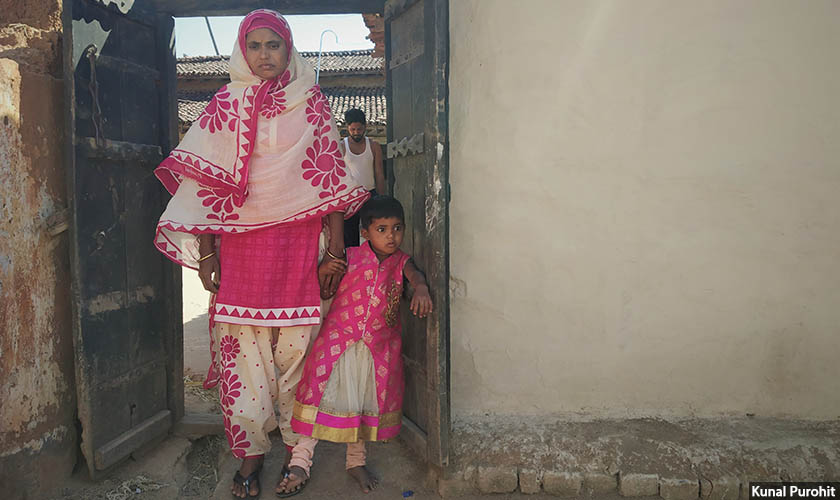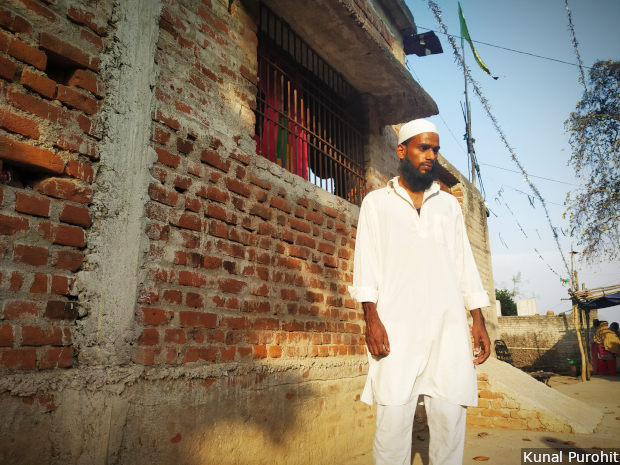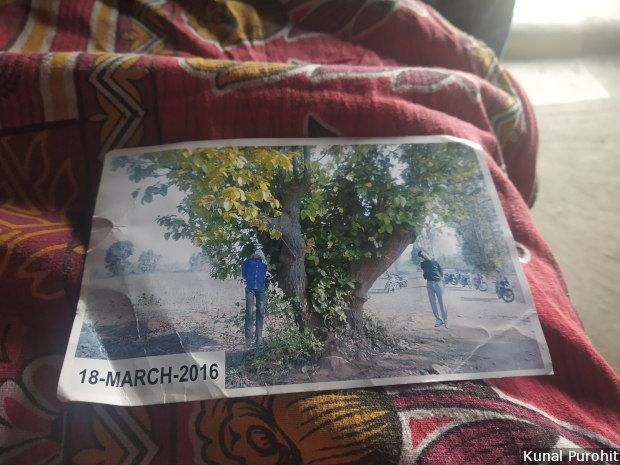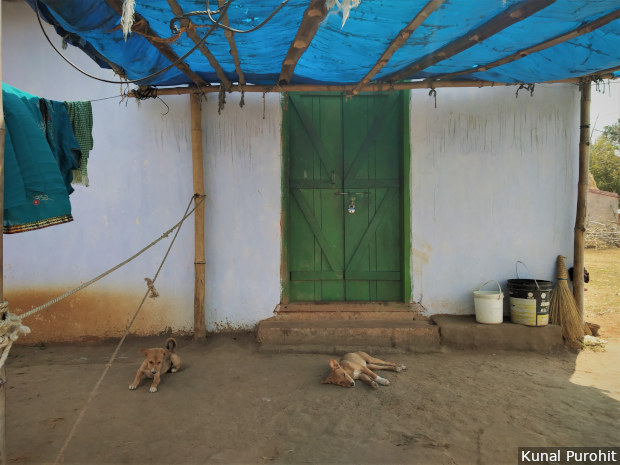Gumla, Latehar, Koderma (Jharkhand): Mohamed Shalik knew his attackers. Imamul Haq did too. As did Majlum Ansari.

Saira Bibi and her daughter at the family’s house in Nawada village of Jharkhand’s Latehar district. Manowar Ansari is seen in the background. When Manowar reached the spot where cow vigilantes had attacked and killed his brother and Bibi’s husband Majlum, he was shocked to see that the two men leading the mob were his brother’s acquaintances.
Each of these three victims of mob lynching in Jharkhand, India’s second deadliest state for hate crimes, knew the members of the mob that attacked them. Shalik and Ansari were lynched, Haq sustained severe injuries that left him bedridden for six months.
During its investigation of seven crimes motivated by religious hatred across six districts of Jharkhand, FactChecker found that in at least four cases, the mob included friends and acquaintances of the victims. Religious hatred has spurred people to violence against schoolmates, childhood buddies and colleagues, forgetting old ties that lie severed ever since.
This is the last in a series of five stories from Jharkhand, which has reported 14 hate crimes and nine deaths since 2009–the second-deadliest state after Uttar Pradesh (23 dead)–all reported after the Bharatiya Janata Party (BJP) won the general and state elections in 2014, according to our Hate Crime Watch database. Reporting for this series coincided with the recent national elections, in which the BJP won 11 of 14 parliamentary seats in Jharkhand.
Traveling across 3,000 km in 13 days, FactChecker visited sites where hate crimes had taken place, met victims’ families, the accused, local residents and police officials. The aim was to investigate the cases, find out what has happened since and document the long-term impacts of hate crime on the lives of people and communities.
In most cases, hate crimes had been provoked by hatred powerful enough to consume community and neighbourhood relationships. The hatred they inflamed seemed to have caused lasting damage to social relations.
Childhood friends, now strangers
Imamul Haq, 24, grew up in Kolgarma, a predominantly Hindu village in Koderma district of northern Jharkhand. He was never conscious of his identity as a Muslim, he told FactChecker on a scorching April day.
In school, his closest friends had all been Hindu boys from the village. “So, I would never be at home, except for my meals. After school, we would spend the day together, playing, goofing around. We would even do our homework together,” Haq said.
As a teenager, Haq was roped in by Hindu villagers to take part in the festivities around the popular Hindu festival of Ram Navami–a spring Hindu festival that celebrates the birthday of Lord Rama of Hindu mythology. He soon went on to become the village’s go-to actor for Ram Navami plays. “Sometimes, when I would be busy and not able to make it to the festivities, my friends would be so upset, they would not talk to me for days,” he said.
All that changed in 2017, ironically, on Ram Navami, which fell on April 4 that year.
A dispute between Hindu and Muslim villagers over the inauguration of a mosque, built on a contested piece of land, caused such tension that Haq did not participate in Ram Navami celebrations that year.
In the evening, Haq was offering his namaaz at the newly-inaugurated mosque when a mob of more than 200 people attacked. “They kept saying Jai Shri Ram [Hail, Lord Ram] and Quran padhna band karo [Stop reading the Quran], even as they assaulted me with sticks, rods and swords,” Haq said.
By the time Haq’s mother rushed in to save him, both his knees had been battered, leaving him bedridden for six months and unable to resume his lucrative job as a driver in Saudi Arabia. “The legs hurt so much even now that it is impossible for me to do any work involving my feet,” he said.

Imamul Haq, 24, outside the disputed mosque in Kolgarma village in Jharkhand’s Koderma district that was attacked by a 200-strong mob from a Ram Navami procession in April 2017. Haq and a few others who were praying inside the mosque were assaulted with sticks, rods and swords. Haq’s Hindu friends have since cut off all ties with him. To Haq, their silence makes them complicit with his assaulters.
Since then, his Hindu friends have cut off all ties with him, he said. “When I met them on the streets and called out to them, they didn’t even turn back. They would look away and walk on. These were people I spent my childhood with,” said Haq, in his measured, soft-spoken manner. “I tried my best to reach out. But the Hindu community imposed a social boycott on us–any Hindu found talking to us would have to pay a penalty.”
To him, his Hindu friends’ silence makes them complicit with his assaulters, he added.
Old ties forgotten
On March 18, 2016, 28-year-old Manowar Ansari got a call from family friend Nizamuddin that his cattle-trader brother Majlum, 32, had been attacked by a mob in Jhabar village in Latehar district. In the 15 minutes it took him to reach Jhabar, Manowar had feared many possibilities. But nothing, he said, had prepared him for what was happening: a mob had surrounded his brother and his fellow cattle-trader, 13-year-old Intiyazul Khan, and were assaulting them. The assault continued for some time before the mob dragged the two, still alive, to a large tree a few metres away.
Then, Manowar said, the mob hanged his brother and Khan. The two tried to free themselves. “So, people started pulling my brother’s legs from the ground to ensure he died,” Manowar said.

Families of both victims have retained, carefully, this image showing the bodies of 32-year-old Majlum Ansari and 13-year-old Intiyazul Khan, hanged from a tree. Cow vigilantes, led by men who were Ansari’s acquaintances, had assaulted these two cattle-traders in Latehar district of Jharkhand when they were taking oxen to a cattle fair, before hanging them alive.
In that small crowd was a familiar face–Bunty Sahu, later named the main accused in the case.
“Sahu knew us very well. He knew my brother so well. In fact, when my brother was making a new house, he had bought cement and other construction materials from Sahu’s shop,” said Mohamed Afzal Ansari, 46, Manowar and Majlum’s older brother.
The Ansari family later learnt that it was Sahu who had first apprehended the two cattle-traders and called up Arun Sahu, the other main accused in the case.
Arun, too, was a familiar face. Some months before the incident, Arun had threatened Majlum and asked him to stop trading in cows. “So, Majlum told him he didn’t deal in cows anyway. He only dealt in oxen, used for agricultural purposes. Majlum asked Arun if he should stop doing that, too,” Afzal said.
Arun “allowed” Majlum to continue, the family said.
Yet, Arun went on to lead the attack. “He was from the RSS [Rashtriya Swayamsevak Sangh]. He was said to be close to top BJP leaders here,” Afzal said of Arun.
That their brother’s killers were people so familiar with him and his work is a fact that still hurts Majlum’s family. So does the location of the assault–Jhabar village.
“Jhabar was a village my brother Majlum had visited tens of times. In fact, he had sold and bought countless cattle from the Hindu families there. Would they have allowed him to trade if he was selling the cattle for meat?” said Afzal.
Community ties severed
For families of hate crimes victims, the silence of friends, neighbours and other villagers becomes a sign of complicity.
“If you let such a crime happen in front of you, it means you’ve tacitly supported it,” said MD Minhaj, a 52-year-old shopkeeper and businessman of Gumla town, after his daily visit to the cemetery where his son, Mohamed Shalik is buried.
Shalik, 20, was lynched by Hindu villagers of Soso, a village 5 km from Gumla town, on April 5 in 2017. The villagers claimed Shalik was harassing a girl from the locality; Shalik’s family as well as the girl’s insisted the two were friends.
According to the first information report (FIR) filed with the police, Shalik was tied to an electric pole just off the Lohardaga road and lynched, with rods and sticks.
When Minhaj reached, Shalik was “adhmara” (half-dead)–slipping in and out of consciousness, his limbs seemed broken, his intestines were hurting. “He said two-three things constantly–he kept asking for water and kept repeating that his stomach was hurting, there was a leher [wave of pain] inside.”
Shalik died in the Gumla Sadar hospital 20 minutes later. But before that, gasping for breath, he managed to tell Minhaj the names of some of the people who had assaulted him. “All the six people he named were those who knew Shalik very well. They were his friends and acquaintances, some even went to school together with him,” Minhaj said. “They took the lead in lynching him. The other villagers joined in, because he was a Muslim.”

The house where Mohamed Shalik was found lying half-dead, the night he was lynched after being tied to a pole, in Soso village near Jharkhand’s Gumla town. Shalik had many Hindu friends from this area, and his school was nearby. His father M D Minhaj later found out that some of Shalik’s acquaintances and old friends had taken part in the lynching.
Six of the main accused were familiar to Minhaj, too. “All of them used to come here, meet me, come to the shops as well. All of them were locals so we knew them very well,” he said, asking his older son to bring out Shalik’s photo. “For two years, I haven’t seen his photo. I can’t bear to look at it.”
Minhaj said he did not know why his son was attacked. But, he links his son’s killing with other hate crimes in the country. “There were two major themes in the air then–love jihad and gau-raksha. This must have egged the mob on,” Minhaj said, pointing to a news clip in a local Hindi newspaper, which reported that Shalik had tried to marry and abduct the girl, painting it as a case of ‘love jihad’, a phrase often used by the Hindu right-wing to describe a relationship between a Hindu woman and a Muslim man.
Minhaj continues to attend to both Hindu and Muslim customers at his shops in the heart of Gumla town’s commercial areas. It is difficult, he said, but he is determined to ensure nothing changes between the two communities after his son’s killing.
“After news of my son’s killing reached the Muslim neighbourhoods in Gumla, many were angry and suggested that we take revenge by attacking Hindu shops. But, I dismissed all such thoughts. I told them this was not acceptable,” Minhaj said, adding, “The Hindu community stood behind me. In fact, I received greater sympathy from them than the Muslim community.”
This concludes our five-part series. You can read the first story here, the second here, the third here and the fourth here.
(Purohit is an independent journalist and an alumnus of the School of Oriental and African Studies (SOAS), University of London. He writes on development, gender, right-wing politics and the intersections between them.)
Courtesy: factchecker.in
